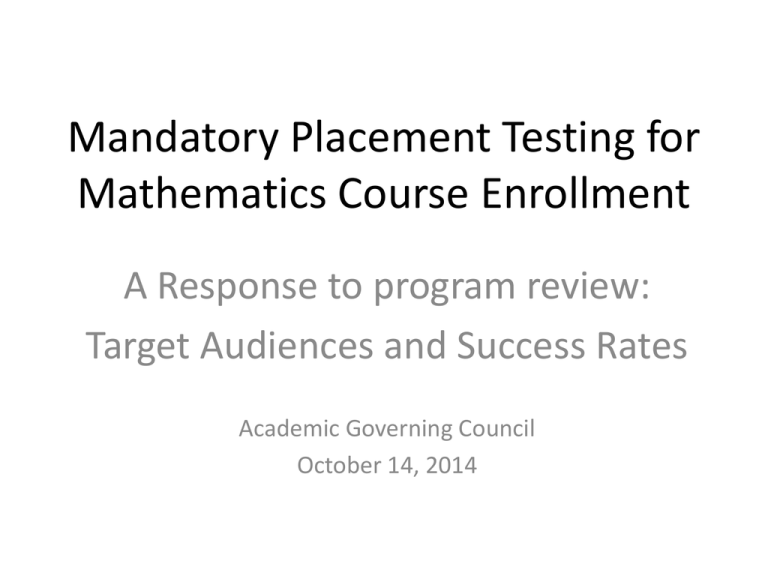Math Testing & Placement
advertisement

Mandatory Placement Testing for Mathematics Course Enrollment A Response to program review: Target Audiences and Success Rates Academic Governing Council October 14, 2014 Intent To implement a policy to accurately assess students’ current prerequisite knowledge for placement into the math course that will provide the best opportunity for success Current Mandatory Placement Policy • Policy Statement - GRCC students whose Accuplacer scores indicate that they need developmental coursework (in English, Math, or Reading) will be required to enroll in and pass that coursework before taking college-level English and Math courses, and other specified college-level courses. • Reason for the Policy - Internal student success data, as well as external research, scholarship, and benchmarking, indicate that students who are required to take developmental coursework before taking college-level coursework are more likely to succeed and persist in their college studies. Placement and Prerequisite • Prerequisites provide students with the knowledge to be successful in a course. • Placement helps students determine whether or not they are adequately prepared to take certain college level courses • To improve the facilitation of student success we want to be able to increase the courses with enforced prerequisites from 6 to 20 • Placement test scores and prerequisite courses need to be current Proposed changes to Mandatory Placement Policy • To require mandatory placement for all students seeking to take a mathematics course at the college who have not been placed in or successfully completed the prerequisite at an institution of higher education in the 8 months prior to the first day of class • Remove names of vendors from mandatory placement policy Feedback Overview We have gained greater knowledge of the concerns of others; there will be additional work to make this transition. A college-wide implementation team would be developed to work for a smooth transition. All feedback considered this to be good for students and desired to figure out how to do what is best for our students. Why 6 months? • Peer recommendations at conference • One of the reasons for poor correlation of ACT scores is the amount of time between assessment and course enrollment • Due to procedural concerns we extended 6month expiration to 8 months. This would allow students to test in January for Fall semester. Registration starts in March. • External research indicates negative correlation of success and time between courses What is misplaced- Validity metrics for placement tests. • The primary metric is the severe error rate. This is calculated by combining two errors: those who are predicted to get •B in the college-level class but are actually placed in DE, and those who are predicted to fail the college-level class but are actually placed directly into that class. • The second metric is the remediation rate, which is the overall percentage of students assigned to DE. • The third metric is the percentage succeeding at C for those directly placed into college-level classes, and • the fourth metric is the overall percentage of students who are placed directly into the college-level class and are predicted to succeed. Who is required to take the Math Placement Test? To enroll in a math course above MA 095, all students must have either successfully completed the specified prerequisite course (C or better) or have a valid, qualifying score on a Math Placement Test. Prerequisite courses and placement scores are valid for 8 months. ADA Compliance of ALEKS • Compliance states that every reasonable accommodation be made so the student is provided the same opportunity. ALEKS developed the Accessible exam and this exam does provide each and every student the same experience and from ALEKS the institution is provided the same detailed analysis of strengths and weaknesses in math as every other student. ALEKS Reading levels • Basic Math/Prealgebra - most topics are between reading levels for grades 3-6 with some topics going up to grade 8. • Beginning Algebra – most topics are between reading levels for grades 5-8 with some topics going up to grade 9. • Intermediate Algebra – most topics are between reading levels for grades 5-9 with some topics going up to grade 10. • Precalculus – topics are between reading levels for grades 7-12 Proposed changes to Mandatory Placement Policy • To require mandatory placement for all students seeking to take a mathematics course at the college who have not been placed in or successfully completed the prerequisite at an institution of higher education in the 8 months prior to the first day of class • Remove names of vendors from mandatory placement policy Intent To implement a policy to accurately assess students’ current prerequisite knowledge for placement into the math course that will provide the best opportunity for success Journal Articles • • • • • • • • • • • • Goldfine, L. S. (2009). Seamless Transitions? Institutional, Demographic, and Course-Specific Effects on Transfer Student Success in Next-In-Sequence Coursework. Foley-Peres, Kathleen, and Dawn Poirier. "College Math Assessment: SAT Scores Vs. College Math Placement Scores. "Educational Research Quarterly 32.2 (2008): 41-8. ProQuest. Web. 26 Aug. 2014. Marwick, J. D. (2004). Charting a path to success: The association between institutional placement policies and the academic success of Latino students. Community College Journal of Research and Practice, 28(3), 263-280. Belfield, C., & Crosta, P. M. (2012). Predicting success in college: The importance of placement tests and high school transcripts. Bailey, T. (2009). Challenge and opportunity: Rethinking the role and function of developmental education in community college. New Directions for Community Colleges, 2009(145), 11-30. Kowski, L. E. (2013). Does high school performance predict college math placement?. Community College Journal of Research and Practice, 37(7), 514-527. Amey, M. J., & Long, P. N. (1998). Developmental course work and early placement: Success strategies for underprepared community college students.Community College Journal of Research and Practice, 22(1), 3-10. Reisel, J. R., Jablonski, M., Hosseini, H., & Munson, E. (2012). Assessment of factors impacting success for incoming college engineering students in a summer bridge program. International Journal of Mathematical Education in Science and Technology, 43(4), 421-433. Fine, A., Duggan, M., & Braddy, L. (2009). Removing remediation requirements: Effectiveness of intervention programs. Primus, 19(5), 433-446. Knowlton, E. H. (2011). An Intervention Strategy Designed to Reduce Math Remediation Rates at Community Colleges. Northcentral University. Ahlgren, A., & Harper, M. (2011). Assessment and Placement through Calculus I at the University of Illinois. NOTICES OF THE AMS, 58(10). Reddy, A. A., & Harper, M. (2013). ALEKS-based Placement at the University of Illinois. In Knowledge Spaces (pp. 51-68). Springer Berlin Heidelberg. Request for Feedback Please send feedback to oneal@grcc.edu by Friday, October 27 so that the Math Department can consider your feedback before the final presentation to AGC on Tuesday, November 11 Thank You







